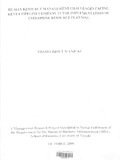| dc.description.abstract | In 2004, Kenya Pipeline Company started implementation of the Enterprise Resource Planning (ERP) System to improve efficiency in its operational systems. The implementation process is still on-going. This study determined the challenges faced by company in the implementation of Enterprise Resource Planning. A case study design was adopted with a focus on descriptive of characteristics and status of Enterprise Resource Planning implementation at Kenya Pipeline Company. An interview guide was used to obtain information from the respondents.
This study revealed that Enterprise Resource Planning implementation has been successful. 72% of respondents indicated that Enterprise Resource Planning has improved processes, resulting to a high degree of efficiency. The study findings indicated that the human resource challenges facing Kenya Pipeline Company in the Enterprise Resource Planning implementation are lack of proper consultation with is the stakeholders including the junior staff who interact with Enterprise Resource Planning on daily basis, failure to introduce the Enterprise Resource Planning system and operations to the staff before implementation, lack of proper training on Enterprise Resource Planning to staff, lack of creating demand stimulation program prior to implementation so that the Enterprise Resource Planning is demand driven as opposed to supply driven, complexity of Enterprise Resource Planning system due to failure to conduct an organization audit prior to implementation process, entrusting the process to outsider (constant) with little committed leadership into the process, lack of addressing organization culture such as political interference and failure to ensure appropriate system and tool that would support the implementation process such as rewarding systems and preparing implementation manual for relevant staff.
The study suggested recommendations for improvement including conducting sensitization and awareness programmes targeting the relevant stakeholders in order for them to appreciate the Enterprise Resource Planning operations and embrace the system, develop job on training programmes for the staffs in order for them to update themselves with the changing Enterprise Resource Planning system technology, institute proper supportive systems such as performance based pay and promotions geared towards recognization of the staff involved in the implementation processes and also to those working with Enterprise Resource Planning system and dealing with inhibitive cultural practices such as improving encouraging professionalism among staff, impartial in decision making and un-receptive to politics. | en |

